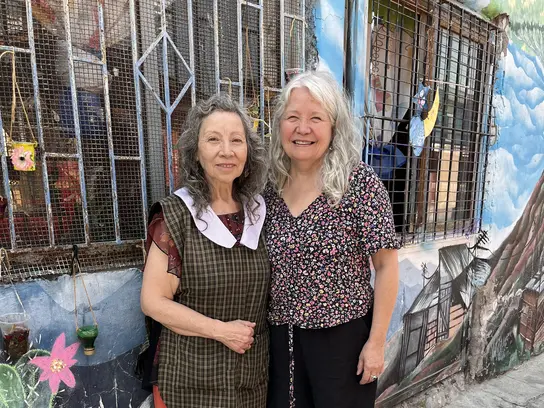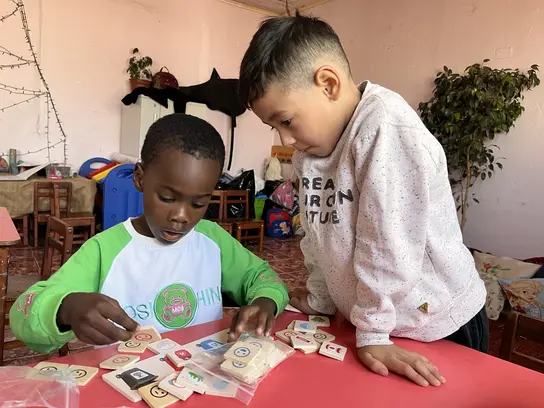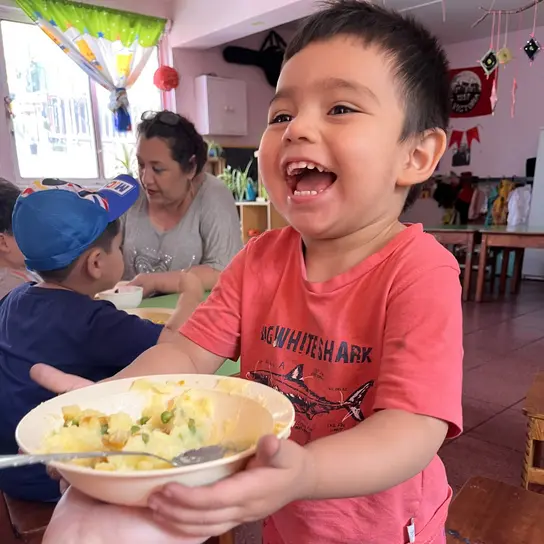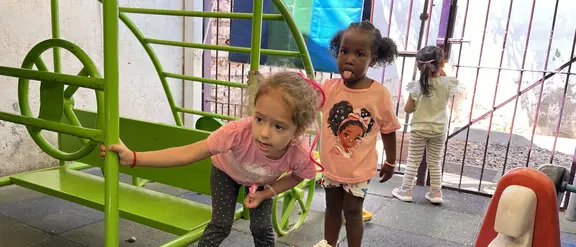
What is the biggest problem in La Victoria right now?
Rosani: The biggest problems are violence and drug use. Relationships between neighbors have changed as a result. Many people have moved away. They couldn't cope. But there are still many social organizations here. Doing social work now requires a lot of strength and perseverance. But we won't give up. We'll keep going.
Valentina: There are gangs fighting over territory. This affects everyone. This neighborhood has always been very humane and supportive, but individualism has taken over more and more space. Solidarity is being lost.
What distinguishes a Red CEC kindergarten from other kindergartens?
Valentina: We're not just a kindergarten. We work with the families, with the entire neighborhood. We don't want to be an island. Other kindergartens stay indoors, partly for safety reasons. But we want to go out into the streets. We work with the whole community and don't want to hide from the problems.
Rosani: People believe in us, and we're carrying on. We're not hiding. We go out with the children, demonstrating for peace and non-violence. We want to be visible. And I think that's having an effect. We're very well-regarded here.

Do you also visit the families at their homes?
Rosani: Very often. If we see that a child isn't doing well, we visit the family. We ask what's wrong if a child doesn't come to school. We also help if families need something. We don't have the money to support them financially. But we can go to the city administration and help them get government assistance.
Is there a xenophobic atmosphere due to the violence problems?
Rosani: There are people who say that violence has increased with immigration. But most say: The migrants are just as poor as we are. They work just as hard as we do. There's no difference. Most are well integrated here. But yes, there are also migrants who exploit our openness. For example, drug dealers have bought land and rent out very small houses to other migrant families for a lot of money. They take advantage of their plight.
How does networking help municipal kindergartens?
Rosani: Networking is a great asset. It strengthens us and our work. We are currently working on the topics of gender equality, environmental protection, and peace education. We are considering how best to integrate them into our teaching methods. There is a committee for each of the three topics, to which each of the twelve Red CEC kindergartens sends a representative. We learn a great deal from each other.
How, for example, can you teach such young children about environmental protection?
Rosani: For example, we go to a public square and collect the trash. The children should learn to protect public spaces and set an example for adults. We also tell them that other people have little water and that it should be used sparingly. They learn to take responsibility.
What do you do when a child says that their dad often hits their mom?
Rosani: We try to distract the child a little and at the same time investigate what's going on in the family. Unfortunately, there isn't much we can do. But perhaps we can visit the family and ask: Hello, how are you? Your child has been very nervous lately. Or sad. What could be the reason for that?

Is it sometimes necessary to inform the child protection authorities?
Valentina: Yes, if the situation at home is very bad, sometimes it's necessary. People get scared. They think their child will be taken away. Sometimes they distance themselves. That's very bad, and we want to avoid that. Families should know: We only want to support them, not accuse them. But we are childcare workers, not psychologists. We can't be responsible for everything. But that's often expected.
Rosani: It is the state that must protect the children and respond to difficult situations. We must cooperate with it. But it is very sad when families no longer send their children here. That's why we must be very careful in such cases.
This is complicated…
Rosani : Yes, very much so. Removing the child from the family is also not a solution. Children's homes aren't good either, often worse than the child's own family.
What can be done?
In many cases, we can only make our own space a place of peace. A place where the child feels comfortable. Where they can play and be happy. The children are here from 8:30 a.m. to 4:30 p.m. That's a long time.
Are there children who don't want to go home?
Valentina: Not the little ones, they want their mom. But with the older ones, it definitely happens. Some children are mistreated by their parents. Or they're given a cell phone so they don't disturb anyone. We have a child who lives alone in a room with their mother, and the mother works shifts. When she's on the night shift, the child is left alone. Locked in.
How can the violence be stopped? The police aren't helping?
Rosani: No, the police aren't helping. I believe it's important to speak out, to call things by their name. Last year, there was a shooting nearby in which three young people died. A 13-year-old girl we knew well was among them. She was active in youth work. But we won't be intimidated. We'll continue to take to the streets—with the children. Despite all the fear. We have to remain visible; we need to be heard. The families support us. We are highly respected. We don't operate behind closed doors. We are part of this community.
*Network of Community Education Centers/Red de Centros de Educación Comunitaria
